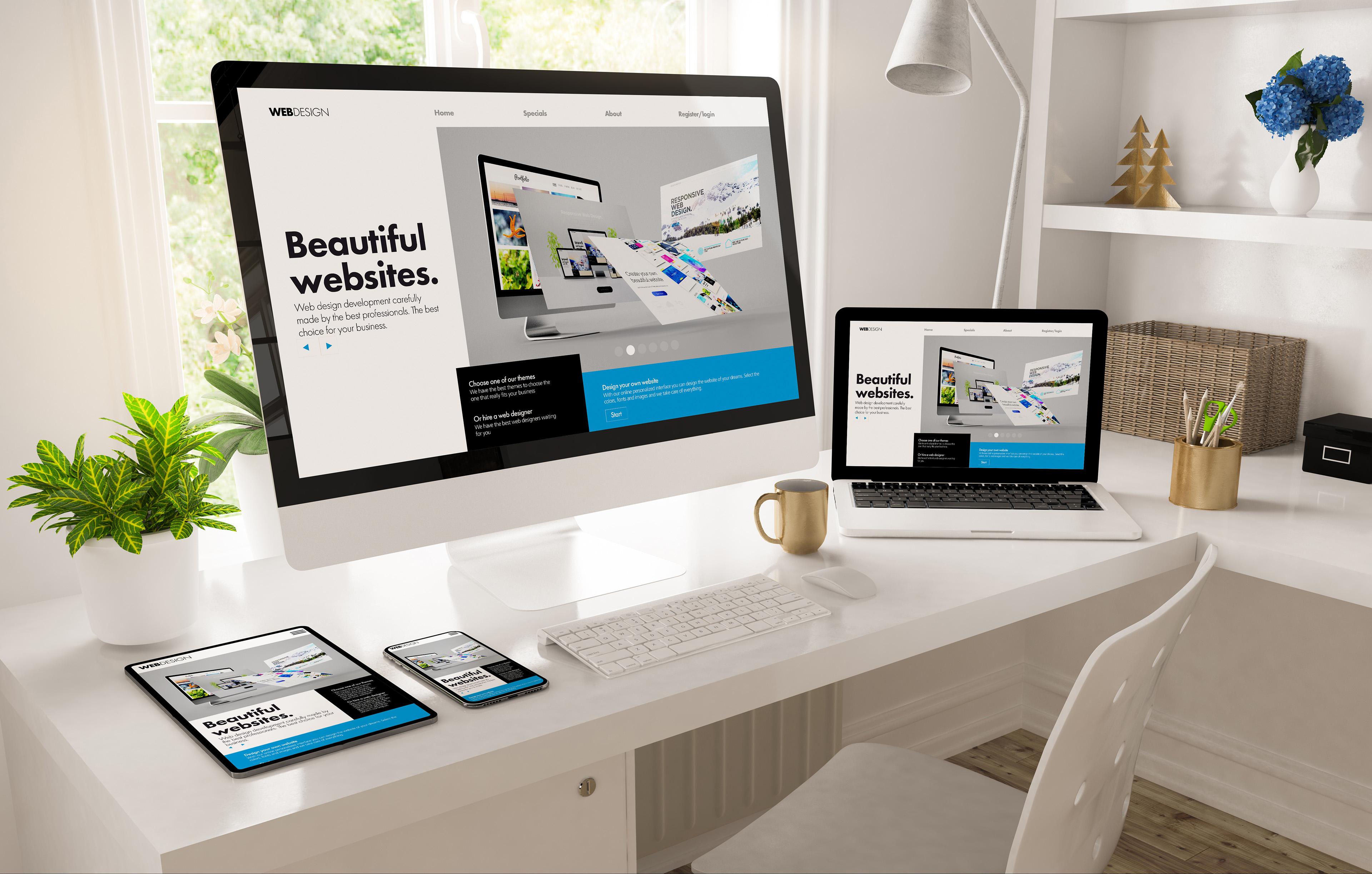Published: 26 Jul 2024
Last updated: 01 Aug 2024
Read time: minutes
Introduction
Having a robust online presence is crucial for any business. A critical part of this presence is the content management system (CMS) that powers your website. In this blog, we'll discuss what a CMS is, explore headless CMS, and why businesses need them. We'll also provide an overview of several popular CMS tools, analysing their features, benefits, weaknesses, and pricing to help you make an informed decision.
See our web design services, or get in touch for more information.
What is a CMS?
A Content Management System is software that enables users to create, manage, and modify content on a website without needing specialised technical knowledge. A CMS provides a user-friendly interface that allows for easy website content updates, which is crucial for maintaining an engaging and relevant online presence.
Key features to look for in a content management system
Choosing the right CMS is a decision that can shape your content strategy and overall user experience. Whether managing a blog, e-commerce site, or corporate website, having the right features can make a significant difference. Here's what to look for:
Ease of use - requirements
Unless using professional developers and designers, a CMS may need to be intuitive and user-friendly, enabling you to create, edit, and publish content effortlessly. If this is the case, look for a system with a clear, navigable interface that doesn't require advanced technical skills. A WYSIWYG (What You See Is What You Get) editor is particularly helpful, allowing you to format your content visually, just as it will appear once published, making the editing process straightforward and accessible.
Customisability
Your CMS should allow you to express your brand’s unique identity. Customisable themes and templates can help you achieve the look and feel that aligns with your brand. Furthermore, the ability to extend functionality through plugins and extensions means you can add new features and capabilities as your site grows, ensuring that your CMS adapts to your evolving needs without requiring a complete overhaul.
Scalability
As your business grows, your CMS needs to be able to scale with you. It’s important that the CMS handles increased traffic and larger volumes of content efficiently without compromising on performance. Whether you’re expanding your team, adding new content types, or increasing your user base, the CMS should support your growth seamlessly, ensuring your site remains fast and responsive.
Content management features
Effective content management is at the heart of any CMS. Features like version control allow you to track changes and revert to previous versions, maintaining the integrity and quality of your content. Content scheduling is another essential feature, enabling you to plan and automate your posts and updates, ensuring your content is published at the optimal time for your audience.
SEO and marketing tools
A good CMS should come with built-in tools to enhance your SEO efforts. Features that allow you to optimise titles, meta descriptions, and URLs can significantly improve your site’s search engine rankings. Additionally, seamless integration with analytics tools is crucial, providing insights into site performance and visitor behaviour, helping you refine your strategies and achieve your marketing goals.
Security
Security is paramount for any website. A robust CMS should offer comprehensive user management and permissions, ensuring that only authorised personnel can access and modify content. Regular updates are also essential, as they help protect your site against new threats and vulnerabilities, keeping your data and your users’ data safe.
Community and support
Comprehensive documentation and tutorials are invaluable, helping you make the most of your CMS features. Equally important is access to professional support and an active user community. When issues arise or when you need advice, having a robust support system ensures that you can resolve problems quickly and efficiently.
Cost
Finally, consider the cost of the CMS. Evaluate your budget, taking into account any licensing fees, hosting costs, and additional expenses for plugins or extensions. Ensure that the CMS offers value for money by providing the features and capabilities you need without unnecessary expenditure, allowing you to invest wisely in your content management strategy.
By focusing on these key features, you can choose a CMS that not only meets your current requirements but also supports your future growth and evolving content strategies.
What is a headless CMS?
A headless CMS is a back-end only content management system that separates the content repository (body) from the presentation layer (head).
Headless CMS allows you manage your content in one place and deliver it to any device or platform. Unlike traditional CMSs, which are tied to a specific website layout, a headless CMS provides content through an API (Application Programming Interface), allowing developers to design how and where the content appears.
Imagine you have a blog. With a traditional CMS, the system handles both the content and how it looks on your blog site. With a headless CMS, you enter your blog posts into the CMS, but you can display those posts on a website, a mobile app, or even a digital billboard, each with a different design and layout.
A headless CMS provides the content while giving developers the flexibility to present that content in any way they choose.
Why choose a headless CMS?
- Omnichannel delivery: Content can be delivered to websites, mobile apps, IoT devices, and more.
- Flexibility: Developers can use their preferred front-end tools and frameworks.
- Scalability: More suited for complex and large-scale projects.
- Performance: Often faster since it focuses solely on the back-end content management.
Why businesses need a CMS
- Efficiency: Simplifies content creation and updates.
- Consistency: Ensures consistent presentation of content across the site.
- SEO-friendly: Facilitates better search engine optimisation.
- Scalability: Allows for easy scaling as your business grows.
- Collaboration: Multiple users can work on content simultaneously.
Overview of popular CMS tools
1. WordPress
WordPress is the most widely used CMS in the world, known for its flexibility and extensive ecosystem. It powers over 40% of all websites on the internet, ranging from simple blogs to complex e-commerce sites.
There are two different WordPress platforms, "WordPress.com" and "WordPress.org", see below for a breakdown of each:
WordPress.com
Hosting:
WordPress.com is a fully hosted service, meaning your website is hosted on WordPress’s servers. You don't need to worry about finding a hosting provider.
Ease of use:
It's more user-friendly for beginners since it handles much of the technical side for you.
Cost:
Offers free and paid plans. The free plan includes WordPress.com subdomain, basic customisation, and ads. Paid plans start at a low cost and offer more features like a custom domain, more storage, and removal of ads.
Maintenance:
WordPress.com handles all updates, backups, and security, so you don’t have to.
Customisation:
Limited compared to WordPress.org. You can only use the themes and plugins provided by WordPress.com, and some customisations require a paid plan.
Monetisation:
Limited options for monetisation on the free plan. Paid plans offer more options, including ads and eCommerce capabilities.
WordPress.org
Hosting:
WordPress.org is self-hosted, meaning you need to find and pay for your own hosting provider.
Ease of use:
Requires more technical knowledge as you need to install WordPress software on your server, manage updates, backups, and security yourself.
Cost:
The WordPress software is free, but you will need to pay for hosting, domain registration, and any premium themes or plugins you choose to use.
Maintenance:
You are responsible for maintaining your site, including updates, backups, and security.
Customisation:
Highly customisable. You can use any theme or plugin you want (free or premium), and you can modify the underlying code to suit your needs.
Monetisation:
Full control over monetisation options. You can use ads, eCommerce, memberships, and more without restrictions.
WordPress.com vs WordPress.org summary
WordPress.com is great for beginners or those who want a hassle-free experience with less customisation and technical responsibility.
WordPress.org is ideal for users who want full control over their website, including customisation and monetisation options, and are comfortable managing technical aspects like hosting and maintenance.
Main features:
- Extensive library of themes and plugins.
- User-friendly interface.
- Strong community support.
- SEO and blogging tools.
Main benefits:
- Highly customisable.
- Large ecosystem of plugins.
- Suitable for various types of websites.
Main weaknesses:
- Can become slow with many plugins.
- Security vulnerabilities if not maintained.
Pricing:
- WordPress.org is free (with optional paid plugins and themes).
- WordPress.com also has a free version - paid subscriptions starts at £8/month (or £3/month if you pay yearly) rising to their VIP plans which start at around $25,000 per year (roughly £19,500), with a variety of options in-between.

2. Shopify
Shopify is a leading e-commerce platform designed specifically for online stores and retail point-of-sale systems. It’s known for its ease of use and e-commerce capabilities.
Features:
- E-commerce focused.
- Easy product management.
- Built-in payment processing.
- Mobile-friendly designs.
Benefits:
- Excellent for online stores.
- Great customer support.
- SEO and marketing tools.
Weaknesses:
- Limited customisation compared to open-source CMSs.
- Monthly fees can add up.
Pricing:
- Starting at £25/month (£19/month if paid yearly).
- More advanced options start at $2,300/month on a 3 year term.

3. Umbraco
Umbraco is an open-source CMS that offers a high degree of customisation and flexibility. Built on the .NET framework, it’s a popular choice for developers and enterprises needing a high-quality, powerful and scalable solution.
Features:
- Open-source.
- Strong content management capabilities.
- Customisable through .NET framework.
- Extensive API.
Benefits:
- Flexibility for developers.
- Scalable for enterprise solutions.
- Good support community.
Weaknesses:
- Steeper learning curve.
- Requires technical knowledge for setup.
Pricing:
- Free for basic use (paid plans for premium features).
- Cost of developers.
- Cost of hosting.
Umbraco costs can vary depending on the requirements.
4. Wix
Wix is a cloud-based website builder and CMS known for its intuitive drag-and-drop interface, making it a popular choice for small businesses and individuals without technical skills.
Features:
- Drag-and-drop builder.
- Hundreds of templates.
- Integrated SEO tools.
Benefits:
- Extremely user-friendly.
- Quick setup.
- No coding required.
Weaknesses:
- Limited customisation.
- Not suitable for very large websites.
Pricing:
- There is a free basic plan with limited features.
- Paid plans start from £9/month rising to £119/month.
- Wix studio also has enterprise solutions with custom pricing.

5. Squarespace
Squarespace is known for its elegant and professionally designed templates. It’s an all-in-one solution that includes website building, hosting, and e-commerce capabilities, making it ideal for creatives and small businesses.
Features:
- Elegant and professional templates.
- Built-in e-commerce capabilities.
- Integrated blogging platform.
Benefits:
- High-quality design templates.
- User-friendly interface.
- Good for small businesses and creatives.
Weaknesses:
- Limited customisation options.
- More expensive than some other CMSs.
Pricing:
- Doesn't offer a free plan.
- "Personal" plans start at £16/month (£12/month if paid annually) rising to £43/month for their "advance commerce" plans.
- Squarespace offers custom plans for larger businesses.

6. Webflow
Webflow combines a visual design tool with a CMS and hosting platform, offering a unique solution for designers and developers who want to create custom, high-performance websites without extensive coding.
Features:
- Visual design interface.
- Custom code capabilities.
- CMS and hosting in one.
Benefits:
- Useful design tools.
- Flexible for designers and developers.
Weaknesses:
- Can be complex for non-designers.
- Higher learning curve.
Pricing:
- Free for basic use
- Paid plans start at around £14/month (around £11/month if paid yearly).
- Webflow also have custom plans for larger enterprise requirements.

7. LinearPro
LinearPro is our in-house CMS, developed by our web design and development team and built on Umbraco CMS. Our powerful business website builder is capable of developing high-quality, high-performance websites, capable of handling large volumes of users at any one time.
Features:
- Intuitive design for easy editing.
- Custom CMS.
- Highly secure.
- Fully managed.
Benefits:
- Powerful design tools.
- Flexible for designers and developers.
- Experts with complete knowledge on LinearPro.
- Easy to learn.
Weaknesses:
- If you want a complex design, you may have to pay for developer assistance.
Pricing:
- From £200 - £725/month depending on requirements.

Conclusion
Choosing the right CMS for your business depends on your specific needs, technical expertise, and budget. Whether you prioritise ease of use, customisation, or powerful e-commerce features, there's a CMS tool out there to suit your requirements. It is important not to underestimate the value of choosing the correct CMS for your business, at the end of the day, this is to create your online business storefront. Evaluate each option carefully, consider the features, benefits, weaknesses, and pricing to make the best choice for your business.
By understanding what a CMS is and how it can benefit your business, you are well-equipped to enhance your digital strategy and develop a compelling online presence. Contact our team to discuss the the best solution for your business.











